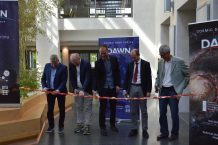Inauguration of DAWN – The Cosmic Dawn Center
Last week, a new Center of Excellence, the Cosmic Dawn Center (DAWN), officially opened. During the next six years, head of center Sune Toft, together with a team of international colleagues, will examine the cosmic dawn that revealed the first galaxies, stars, and black holes in the universe.

June 22 was the day of the official inauguration of the DNRF’s new Center of Excellence: The Cosmic Dawn Center (DAWN).
The center has received a grant of 66 million DKK for the next six years, with the possibility of an extension up to a total of ten years.
Professor and astrophysicist Sune Toft is in charge of DAWN, which will study the cosmic dawn: the time when the young universe was transformed from a foggy darkness into a translucent universe, where the first galaxies, stars, and black holes appeared. The cosmic dawn existed around 300-600 million years after the Big Bang, and the period is hitherto an unexplored research field.
Through observations with high technological super-telescopes, such as the James Webb Space Telescope (JWST), the center will examine when and how the early galaxies, stars, and black holes were formed. The JWST is expected to be launched in 2021, and with its ultra-sharp resolution, it can detect light up to six times more than the Hubble telescope. Thus, it is capable of detecting even the weakest light from long-gone dead stars and the earliest galaxies of the universe. As Sune Toft said in his speech at the center’s inauguration ceremony:
“Telescopes are time machines allowing us to look back in time.”
DAWN is a part of the Technical University of Denmark Space and the Niels Bohr Institute at the University of Copenhagen. The inauguration was held at Vibenshus, which will be part of the center’s primary location until the new Niels Bohr Building is finished. The ceremony began with a short welcome from the CEO of the Danish National Research Foundation, Søren-Peter Olesen. Then, the associate dean for research at the University of Copenhagen, Morten Pejrup, noted that freedom is the key to research at every university.
The director of DTU Space, Kristian Pedersen, began his speech by stressing how DAWN will transform our understanding of the birth of universes. Also, he highlighted the importance of the center’s international collaboration, which can set new standards for the Technical University of Denmark and the University of Copenhagen.
Jan Thomsen, the head of the Niels Bohr Institute, introduced his speech by congratulating Sune Toft on getting through the eye of the needle, and he echoed Kristian Pedersen’s words on the collaboration between the two universities. Head of center Sune Toft finished the program by expressing his joy at being a part of the center’s powerful international team, which already includes 14 nationalities among its members.
The inauguration concluded with a reception.
